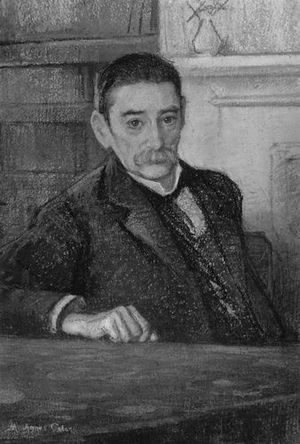William George Aston facts for kids
Quick facts for kids
William George Aston
|
|
|---|---|

William George Aston, 1911
|
|
| Born | 9 April 1841 |
| Died | 22 November 1911 (aged 70) |
| Nationality | Anglo-Irish |
| Occupation | diplomat, educator |
William George Aston (born April 9, 1841 – died November 22, 1911) was an important person from Ireland. He was a diplomat, author, and expert in the languages and history of Japan and Korea. He helped Western scholars learn more about these countries.
Contents
Early Life and Education
William George Aston was born near Derry, Ireland. He was a very bright student. From 1859 to 1863, he studied at Queen's College, Belfast. There, he learned a lot about languages. He studied Latin, Greek, French, German, and modern history. This deep study of languages is called philology.
A Career in Diplomacy
In 1864, Aston became a student interpreter for the British government in Japan. This meant he helped translate and understand Japanese. He quickly became very good at the Japanese language. In Edo (now Tokyo), he worked with Ernest Mason Satow. Together, they started to deeply study the Japanese language. Their work helped other Western scholars begin to understand Japanese.
Aston passed an important test in 1884. This allowed him to work in the British Consular Service. He served in British offices in Tokyo, Kobe, and Nagasaki. These offices helped British citizens and businesses in Japan.
From 1884 to 1885, Aston was the top British diplomat in Korea. He was called the consul-general. He returned to Tokyo in 1885. There, he became the Secretary of the British Legation. This was another important diplomatic role. In 1889, he retired from his job because he was not well. He then moved to England. He received a special honor called CMG for his work.
His Work in Japan
Aston made big contributions to studying Japan's language and history. He was one of three main British experts on Japan in the 1800s. The other two were Ernest Mason Satow and Basil Hall Chamberlain.
Aston was the first person to translate the ancient Japanese book Nihongi into English. This was a huge achievement in 1896. He also wrote two books on Japanese grammar in 1868 and 1872. In 1899, he published A History of Japanese Literature. He often gave talks to the Asiatic Society of Japan. Many of his important papers were published by them.
After his death, Cambridge University Library bought many rare Japanese books. These books came from Aston's and Satow's collections. They helped start the library's Japanese collection.
His Work in Korea
In 1884, Aston was the first European diplomat to live in Korea. However, the country was not stable at that time. Because of this, he had to leave in 1885.
From 1885 to 1887, Aston continued to study the Korean language in Tokyo. He had a Korean teacher named Kim Chae-guk. This teacher wrote many stories for Aston to practice with. Aston later gave these handwritten Korean folk tales to a museum in St. Petersburg, Russia. They were published in 2004. Today, these stories are kept safe at the Russian Academy of Sciences in St. Petersburg.
Later Years and Legacy
After retiring, William George Aston continued to write. He published books about Japanese literature and Japanese religion. He also wrote many articles about Korean topics. He passed away on November 22, 1911, in Beer, Devon, England.
Besides his Japanese books, Aston also had a large collection of Chinese and Korean books. These were also bought by Cambridge University Library after he died. His work helped many people in the West learn about the rich cultures of Japan and Korea.
Selected Works
William George Aston wrote many books and articles. Here are some of his most important works:
- 1869 — A Short Grammar of the Japanese Spoken Language
- 1872 — A Grammar of the Japanese Written Language, with a short chrestomathy
- 1877 — A Grammar of the Japanese Written Language
- 1888 — A Grammar of the Japanese Spoken Language
- 1889 — Early Japanese history
- 1896 — Nihongi; Chronicles of Japan from the Earliest Times to A.D. 697
- 1899 — A History of Japanese Literature (available at Wikisource)
- 1899 — Toriwi--its derivation
- 1902 — Littérature japonaise
- 1905 — Shinto, the Way of the Gods.
- 1907 — Shinto, the Ancient Religion of Japan
Articles
- 1879 — "H.M.S. Phaeton at Nagasaki," Transactions of the Asiatic Society of Japan, Vol. 7, pp. 323–336.
See also
- Anglo-Japanese relations
- British Japan Consular Service
- List of ambassadors of the United Kingdom to Korea
 | John T. Biggers |
 | Thomas Blackshear |
 | Mark Bradford |
 | Beverly Buchanan |

